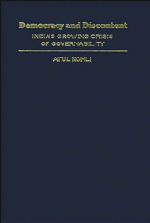Book contents
- Frontmatter
- Contents
- List of tables and figures
- Preface and acknowledgments
- PART I INTRODUCTION
- PART II THE GROWING PROBLEMS OF GOVERNING THE PERIPHERY: POLITICS IN THE DISTRICTS
- Introduction: the districts
- 3 Kheda, Gujarat
- 4 Guntur, Andhra Pradesh
- 5 Belgaun, Karnataka
- 6 Calcutta, West Bengal
- 7 Madurai, Tamil Nadu
- Conclusion: the districts
- PART III ORDER AND BREAKDOWN IN THE STATES
- PART IV CENTRALIZATION AND POWERLESSNESS AT THE CENTER
- PART V FINAL INFERENCES
- Bibliography
- Index
3 - Kheda, Gujarat
Published online by Cambridge University Press: 05 June 2012
- Frontmatter
- Contents
- List of tables and figures
- Preface and acknowledgments
- PART I INTRODUCTION
- PART II THE GROWING PROBLEMS OF GOVERNING THE PERIPHERY: POLITICS IN THE DISTRICTS
- Introduction: the districts
- 3 Kheda, Gujarat
- 4 Guntur, Andhra Pradesh
- 5 Belgaun, Karnataka
- 6 Calcutta, West Bengal
- 7 Madurai, Tamil Nadu
- Conclusion: the districts
- PART III ORDER AND BREAKDOWN IN THE STATES
- PART IV CENTRALIZATION AND POWERLESSNESS AT THE CENTER
- PART V FINAL INFERENCES
- Bibliography
- Index
Summary
Situated between the cities of Ahmedabad and Baroda, on the Gulf of Cambay on India's west coast, Kheda, in the state of Gujarat, is a relatively prosperous district. Though predominantly rural, the district has many urban characteristics: a high literacy rate, communities that have electricity, and villages that are connected by all-weather roads. Nearly 40 percent of the land under cultivation in the district is used for such commercial crops as cotton, tobacco, and plants whose seeds yield oils. Several agro-based industries, such as dairy production, are also located in the area.
A significant proportion of the population – more than 60 percent of the landowning population, or 40 percent of the total population of the district – own and operate small pieces of land comprising 0.5–2.0 hectares (1.25–4.94 acres). This distribution of land may give the impression that the district is dominated by smallholder cultivators. Although that is not inaccurate, the picture at each extreme of the wealth spectrum should not be ignored: At the rich end, nearly a quarter of the land is owned in parcels larger than 10 hectares (24.7 acres) by fewer than 2 percent of the population. At the other end, about a quarter of the population own no land, and another quarter own less than 0.5 hectare per household.
The two major caste communities of the district, the Patidars and the Kshatriyas, constitute nearly 60 percent of the total population.
- Type
- Chapter
- Information
- Democracy and DiscontentIndia's Growing Crisis of Governability, pp. 37 - 60Publisher: Cambridge University PressPrint publication year: 1991



